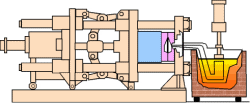Hot Chamber Zinc Castings. The process of hot chamber zinc casting is a process that melts zinc using a 700- to 800-degree Fahrenheit furnace. Once the zinc is liquefied, it stays in the heat. A sleeve is placed in the heat and injected to the molten zinc metal, which is held together by the machine directly from the furnace into the two die halves.
The two halves of the die casting tooling are placed on the machine that keeps the two halves together and remains closed until the next step. Hydraulic pressure solidifies the metal within two to seconds depending on the size of the parts. After this the part is removed and ejected by hand or robotically, the halves are then opened. Trimming, precision machining, tumble deburring painting, chrome plating, anodizing, and assembly will follow.
The hot chamber zinc die castings is intended for zinc, copper, lead, magnesium and others on alloys with low melting point. The process does not destroy and erode metal furnace pots, plungers, and cylinders. The injection mechanism of hot chamber zinc casting machine is done by immersing zinc in the molten metal bath of a metal holding furnace. A port in the injection cylinder opens and the injection cylinder plunger rises, allowing the molten metal to fill the cylinder. One of the advantages of hot chamber zinc diecasting is the fast cycle-time and the easy steps of melting in the casting machine. Disadvantages of this system include the high-melting point metals that cannot be utilized. What’s mote, aluminium is not suited for this system because it picks up some of the iron while in the molten pool.


